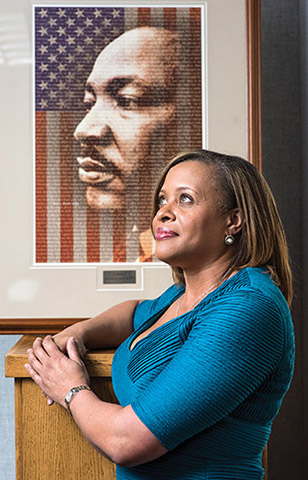
HR AND COMMUNICATIONS DIV. 3000 VP Melonie Parker keeps a portrait of the Rev. Martin Luther King Jr. in her office as a source of inspiration and motivation. Melonie’s parents marched with Dr. King in the 1960s in Greensboro, North Carolina. (Photo by Randy Montoya)
When I was a child growing up in the 1970s, most homes in my predominantly black neighborhood in High Point, North Carolina, had three pictures on their walls: Jesus, Martin Luther King Jr., and John F. Kennedy. These three pictures were generally grouped together either vertically or horizontally and were velvet hangings or framed art. Most of the cities near me had a Martin Luther King Drive in the black community. Every year during Black History Month there were oratorical and essay writing contests that gave tribute to Dr. King and I proudly participated along with my schoolmates. Additionally, we had programs, pageants, and parades to honor Dr. King on his birthday. Dr. King was lauded in our homes, our churches, and in civic organizations such as the Girl Scouts, Boy Scouts, 4-H club, and the Elks.
My parents marched with Dr. King in the 1960s in Greensboro, North Carolina, and a friend’s dad, Franklin McCain, was a member of the now infamous Greensboro Four.
I was taught at an early age that I needed to be better, smarter, and faster than my white peers to compete at the same level. Leveling the playing field literally meant striving to be better than your contemporaries. We were constantly reminded of Dr. King’s “I Have a Dream” speech, which described his dream of a nation of freedom and equality, one where the evils of slavery and hatred were banished to the past. His vision became our quest.
Dr. King has impacted my life since my earliest years. As a child I dreamed of extending my borders beyond my neighborhood and my hometown. I believed that with hard work and commitment to education I could actually achieve my dreams. I have benefited from the affirmative action programs that were put in place thanks to the efforts of Dr. King and his followers. Dr. King’s leadership shaped the environment that made possible the passage of the landmark Civil Rights Act and the Voting Rights Act in the mid-1960s.
Dr. King’s insiration helped awaken consciousness
I also grew up to have sensitivity toward others outside my circle of family, friends, and peers. It’s easy to miss circumstances that affect others, to not understand perspectives different than your own when your consciousness is not awakened. Dr. King’s inspiration helped awaken mine. In his August 1967 speech, “Where do we go from here?” he said, “True compassion is more than flinging a coin to a beggar; it is not haphazard and superficial. It comes to see that an edifice which produced beggars needs restructuring.” Dr. King had a vision that race would not be a factor in how people were treated or how they were allowed to live their lives.
Recently, a childhood friend who happens to be white wrote that when we were in the 5th grade, she was put in charge of a Thanksgiving mural in our classroom, which was a big deal at that time and place. She recalled that when a boy named Earl took his turn to add his contribution to the mural, he painted in a brown-skinned pilgrim. The teacher, whom my friend loved, adored, and would have done anything for, was irate, and told her to “fix it.” So my friend cut out a blue-eyed, blond-haired face on “flesh-colored” construction paper and covered Earl’s handiwork, obliterating his painting completely. And she was praised for it. In a poignant reflection, she wrote that she felt guilty about that for 40 years, adding that the injustice and her role in it have haunted her all this time. Based on that experience of so long ago, she said she learned that “classrooms are not a pass-through. They shape us.”
Is Dr. King’s vision still relevant in my life today? I say unequivocally yes, it most definitely is! As it should be relevant for all of us. His words are still words to live by, his dream still our inspiration.
Underpinning his brave and tireless fight for racial equality was a deeply held conviction that success must be attained through nonviolence. His principled stand gave him — and his cause — a moral authority that still resonates deeply today. We do a disservice to Dr. King’s memory if we do not acknowledge the progress that we have made as a society, thanks in very large part to his courageous example. We do a disservice to ourselves, though, if we do not recognize that much needs to be done to fully achieve the ideals Dr. King expressed in his “I Have a Dream” speech, that “we will be able to transform the jangling discords of our nation into a beautiful symphony of brotherhood.”